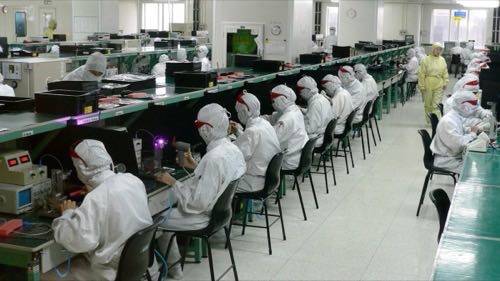
Foxconn, the Taiwanese company that manufactures devices for Apple, Nokia, and Sony, has over 1.2 million employees, mostly in factories on the Chinese mainland. By 2016, it would like to replace as many of those as possible with robots that can do the job 24/7.
That would address the human rights concerns about the company’s working conditions. But is it worth putting 1.2 million people out of work? It’s the classic globalization question.
Foxconn declared its intentions to go robotic last year, announcing that it had 10,000 robots online, ramping up to 300,000 this year. The goal as stated in the 2011 Xinhua article was to get to 1 million robots by 2014. This TechWeb post from January (which was brought to my attention by John Biggs at TechCrunch today) says Foxconn would reach the goal this year.
I used robots to translate the TechWeb post into English, and I think it reveals some interesting tidbits. It describes (vaguely) a gradual process by which certain tasks will be moved over from people to robots, eventually taking over much of the assembly process. Foxconn chairman Terry Gou says that “Foxconn[‘s] young people will [re-learn] to [manipulate] robot software, application and maintenance, to become robot application engineers and software engineers, operating the robot and joint production.”
It’s actually a pretty frank article, acknowledging the tragic suicides of Foxconn workers in 2010 and attributing it to the monotonous, relentless working conditions. No one wants more of that, let alone the underage workers that managed to slip through at one factory. The positive PR in the article points to how much more productive Foxconn will be with these robots, which only cost about $25,000 a piece (three times as much as human workers make). The robots seem like a win-win-win-win.
Foxconn gets unbeatably low production costs and high production volume. Tech companies like Apple might even start competing with China for robot manufacturing, driving prices even lower. Thus customers get cheaper computers. And Foxconn workers get trained for higher-skilled, less awful jobs. Or some of them do, at least. The unspoken implication is that nowhere close to 1.2 million workers will be necessary.
The reporter relates this exchange between two Foxconn workers (forgive the Google Translate weirdness):
“Are you afraid of robots to fight for a job?”
“A little worried.”
“Robot than you good?” [Presumably, “Worried that robots are better workers than you?”]
“Not tired, a robot can top several employees, do not get hurt, and so on.”
It’s a win-win-win-win-lose. The losers are the Foxconn workers who depend on these manufacturing jobs and will lose them to robots. This isn’t just going to affect Foxconn. It’s going to come home to all of us, wherever we live, sooner rather than later. Is it worth the trade-off?
I think it is, but only on one condition, which Vivek Wadhwa articulated on ReadWrite last month: We have to throw all our efforts into reforming education.
Lead image via Wikimedia Commons

















